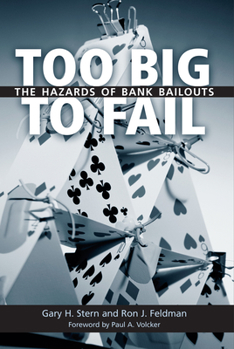Too Big to Fail: The Hazards of Bank Bailouts
Select Format
Select Condition 
Book Overview
" The potential failure of a large bank presents vexing questions for policymakers. It poses significant risks to other financial institutions, to the financial system as a whole, and possibly to the economic and social order. Because of such fears, policymakers in many countries--developed and less developed, democratic and autocratic--respond by protecting bank creditors from all or some of the losses they otherwise would face. Failing banks are...
Format:Paperback
Language:English
ISBN:081570304X
ISBN13:9780815703044
Release Date:March 2009
Publisher:Brookings Institution Press
Length:256 Pages
Weight:0.60 lbs.
Dimensions:0.8" x 5.9" x 8.9"
Customer Reviews
4 ratings
The Psychology of the Market Place
Published by Thriftbooks.com User , 14 years ago
This is fundamentally a psychological interpretation of the relevance of the variable Too Big To Fail (TBTF) on the interactions of policymakers and the banking system. Although the authors do not stress their analysis as a psychological approach their analysis as a psychological approach is a compelling example of a Skinnerian analysis of reinforcements contingencies. It provides a compelling analysis about the causes and effects on TBTF. on both the national and international economies. It recommends essentially a carefully controlled use of incentives and to a lessor extent punishment to reduce both the need for and expectations of TBTF. The contrast between the recommendations of Stern & Feldman in 1994 and the present state off fiscal chaos through contiguous extremes of reward and punishment exerted upon the market by policymakers defies the shaping of not only rational behavior but lends credence to the claim of a "manic depressive market" and why.
Profound reflection on the "too big to fail" doctrine
Published by Thriftbooks.com User , 15 years ago
In this clearly prophetic book, Gary H. Stern and Ron J. Feldman examine the "too big to fail" doctrine, and show how policymakers made the financial system riskier by implicitly promising to bail out the biggest banking institutions. In the wake of the global financial crisis in which several major institutions failed in 2008, getAbstract welcomes this reissued, lucid assessment of one of the most perplexing, perverse policies in financial regulation, the idea that some institutions are too big to fail. Former Federal Reserve Chairman Paul A. Volcker's foreword helps sharpen the book's focus, and the authors' advocacy for an end to bailouts is quite persuasive. This book is recommended reading for anyone seriously interested in understanding the calculus of financial policymakers, financial system risk, and the tilted playing field that benefits huge, risky banks and their shareholders.
3.5 stars-Bank speculation has always been a fundamental problem
Published by Thriftbooks.com User , 16 years ago
Stern and Feldman(SF) do a good job in demonstrating the complete idiocy of deregulating and privatizing the commercial banking industry ,specifically, and the financial sector ,in general ,starting with the Carter administration in 1979 and continuing through all Democratic and Republican administrations through 2008,at a time when the size of the average firm in the industry was getting larger and larger. SF are absolutely correct that the 1991 Federal Deposit Insurance Corporation Improvement Act(FDICIA)did not improve bank regulation substantially and make the too big to fail problem less severe.Ben Bernanke's(coordinated with the financial actions of the other 7 major central banks) 1 trillion dollar bailout ,starting in late August,2007 and continuing through May,2008,of Wall Street and the commercial banking system is just the latest additional piece of evidence that the problem of banker speculation,which has been recognized for thousands of years,is fundamental. I have subtracted one star because the authors appear to have no idea that Adam Smith went over this problem in detail on pp.290-340 of The Wealth of Nations(1776,Modern Library (Cannan)edition).Smith's discussion is a modern,updated analysis of the standard Catholic(Medieval Church)position concerning banking,loans,the rate of interest,usury laws,and speculation.Smith shows clearly that the banks prefer to make loans available to projectors(Keynes's stock and financial market speculators and rentiers) because of the apparent high short run rate of return on such loans.The long run consequences,which impose immense negative externality and spillover impacts on people worldwide , are ignored.Nothing has changed since Smith wrote his masterpiece over 230 years ago.Securitization is a code word for speculation.The last 30 years has seen a continuing parade of junk bonds,phony income and balance sheet accounting claims,dot com bombs,and securities backed by bonds backed by mortgages that were backed up by nothing but claims made by rating agencies and underwriters.
Awesome Analysis
Published by Thriftbooks.com User , 18 years ago
As a 35 year banker (and loan officer) I have seen and survived the dark days of 1985-1992 when the banking industry was on the edge. Penn Square as the harbringer of disaster and the impact on the industry was a rude awakening. Thus, the spectre of TBTF; particularly as more banks continue to grow and we now have trillion dollar financial institutions. This book covers TBTF with outstanding analysis. In fact, it should be required reading for government, regulators, and bankers (certainly senior management and boards), An awesome book.






